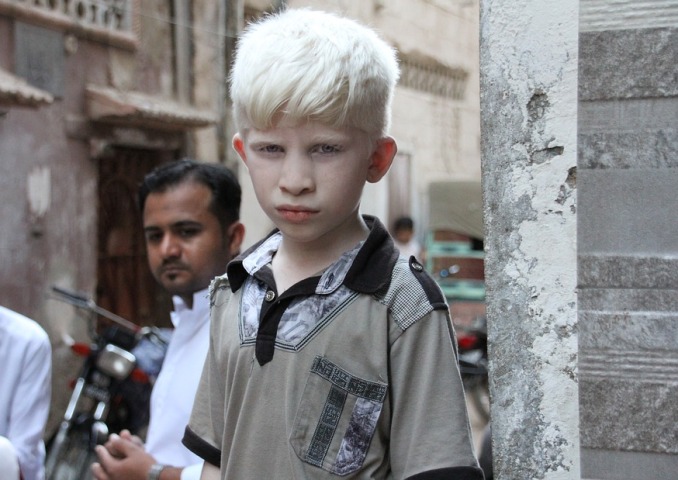UN Expert Warns of Skin Cancer Crisis Among Persons with Albinism, Urges Global Action
According to the report, persons with albinism in Africa are up to 1,000 times more likely to develop skin cancer compared with the general population.

At the United Nations General Assembly, Muluka-Anne Miti-Drummond, the UN Independent Expert on the enjoyment of human rights by persons with albinism, sounded a powerful alarm on the often-overlooked public health emergency facing people with albinism — skin cancer. In her latest report, she revealed that skin cancer has become one of the leading causes of death among persons with albinism, surpassing deaths caused by ritual attacks and other forms of violence.
"The incremental rise in ultraviolet radiation and climate-related disasters implies that persons with albinism are disproportionately at risk of contracting skin cancer regardless of their geographic location," said Miti-Drummond. "This is a bleak and unfortunate reality which can and must be reversed to protect the albinism community globally."
A Preventable Human Rights Crisis
The Independent Expert's findings underscore a tragic and largely preventable human rights crisis. Persons with albinism — who lack melanin, the pigment that protects skin from ultraviolet (UV) rays — face extreme vulnerability to sun-induced skin damage. Without adequate protection, prolonged sun exposure leads to sunburn, photoaging, solar lentigines, actinic keratoses, and ultimately skin cancer, which is responsible for the majority of premature deaths in this population.
According to the report, persons with albinism in Africa are up to 1,000 times more likely to develop skin cancer compared with the general population. The consequences are devastating: 98% of individuals with albinism do not live beyond 40 years of age if they lack access to protective measures such as sunscreen, shade, and early medical treatment. An estimated 80% of these deaths are directly linked to skin cancer complications.
The Role of Climate Change and Inequality
Miti-Drummond's report also highlights how climate change is amplifying risks for persons with albinism. Rising global temperatures, ozone depletion, and increased ultraviolet radiation are worsening exposure hazards, particularly in regions with limited access to dermatological care or affordable sunscreen.
In many low-income and tropical countries, sunscreen is either unavailable or unaffordable, leaving people with albinism exposed to daily harm. The situation is compounded by geographic inequality—while those in wealthier nations can access preventive healthcare and sun protection, communities in developing regions often rely on limited local support and humanitarian aid.
"Skin cancer among persons with albinism is not only a health issue—it is an issue of inequality, discrimination, and neglect," Miti-Drummond stated. "Climate change, poverty, and inadequate health infrastructure together create a lethal mix for people with albinism."
A Global Data Gap
The report underscores a severe lack of official data and research on the prevalence and mortality rates of skin cancer in persons with albinism. Despite extensive global research on cancer, few national health systems collect disaggregated data on how skin cancer specifically affects this population. This data gap, Miti-Drummond warned, obstructs effective policymaking and funding for targeted interventions.
"There is a deplorable dearth of official data and statistics on the impact of skin cancer on persons with albinism despite the existence of international and national research programs on cancer in general," she said. "I implore States to carry out the necessary research and data collection which will enable appropriately targeted measures to be implemented."
Policy Recommendations and Human Rights Obligations
The Independent Expert's report offers comprehensive recommendations to help governments and international institutions address the crisis. Central to these recommendations is the recognition that failure to prevent skin cancer deaths constitutes a violation of fundamental human rights, including the right to health and the right to life.
Key recommendations include:
-
Ensuring universal access to sunscreen and sun-protective materials, including hats, sunglasses, and clothing designed to shield from UV rays.
-
Integrating albinism-specific healthcare services into national cancer and dermatology programmes.
-
Raising public awareness about albinism to counter stigma, discrimination, and misinformation.
-
Conducting nationwide research and data collection on skin cancer among persons with albinism.
-
Collaborating with albinism advocacy groups and affected communities in the design and implementation of national strategies.
-
Expanding dermatological care in rural and under-served areas, particularly in Africa, Latin America, and the Pacific.
Miti-Drummond urged all States to include albinism health priorities within broader frameworks such as the 2030 Agenda for Sustainable Development, particularly under Goal 3 (Good Health and Well-being) and Goal 10 (Reduced Inequalities).
The Cost of Inaction
The Expert stressed that the ongoing neglect of skin cancer prevention for people with albinism is not only a health system failure but also a human rights violation.
"Failure to prevent foreseeable and unnecessary deaths to skin cancer is not just a violation of the right to health, but a violation of the right to life," she said.
She called for a global coalition of States, international organizations, and civil society to ensure equitable access to care, early detection, and protective measures for those most at risk.
Protecting the Right to Life and Dignity
Miti-Drummond's appeal comes amid broader UN efforts to address the intersection of health, climate change, and human rights. Her call highlights the urgent need to view albinism through a public health and equality lens, ensuring that no one is left behind in global health policy.
As she concluded in her address, protecting people with albinism from skin cancer is not merely a medical imperative—it is a moral and legal duty.
"This crisis is preventable. The lives of persons with albinism can be saved with simple, cost-effective interventions—access to sunscreen, regular skin screenings, and education. We must act now to uphold their right to health, dignity, and life."









